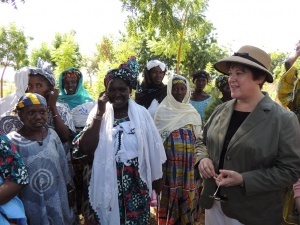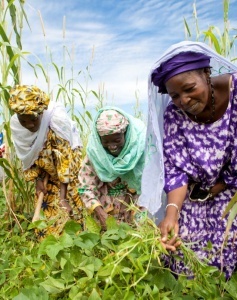On the day before Thanksgiving, Mary Beth Leonard, the U.S. ambassador to Mali, took a trip to see how the farm families and grower cooperatives of Mopti, eight hours northeast of Bamako, the capital, are coping in the challenging conditions of this west African nation.
Making a living by farming is never easy, but if you want a real test, try it in Mali. The landlocked country on the edge of the Sahara Desert ranks just 12 rungs up from the bottom of 187 countries listed on the 2011 Human Development Index by the United Nations Development Programme. One child in three here suffers from chronic malnutrition. In the past year, a food security crisis, caused by erratic rainfall and spikes in food prices, has further hurt Mali’s farm families.
Following a coup in March 2012, conditions got worse. Rebel and Islamist groups took control of northern Mali, claiming independence for an area covering roughly two-thirds of Mali’s land area. More than 300,000 people fled northern Mali in the face of ethnic and religious persecution and human rights violations. Many displaced people sought refuge in the Mopti region, pushing that area’s fragile limits.
Residents of the Mopti region face an unpredictable climate, poor access to markets and harsh seasons of food insecurity. Nearly 79 percent of them live in extreme poverty. So Ambassador Leonard was visiting families tested by a double whammy of a food crisis and civil unrest.
She found glimmers of hope. In a situation that requires a multi-pronged response involving health, education and livelihood training, USDA and its partners are giving Malians a chance through better skills and opportunities.
Season Training

Ambassador Leonard visiting with women farmers at an AKF-managed farmer field school.
On Nov. 21, Ambassador Leonard got a close-up look at programs that provide crucial help to farmer co-ops and other groups, including several managed by the Aga Khan Foundation U.S.A. (AKF USA), which has long supported farm training and livelihoods in Mopti. Its programs ensure that farm families have the materials and skills for off-season agriculture, while building their resilience against future crises.
With funding from USDA, AKF has also scaled up efforts to prevent and treat child malnutrition through support of school-feeding programs, by educating parents about nutrition and by training community health workers. With the threat of political unrest and food insecurity, new funding from USDA and the U.S. Agency for International Development is helping to respond to the area’s most urgent needs.
The ambassador’s convoy visited the village of Soufouroulaye, where an AKF-managed farmer field school brings together women who grow millet, sorghum and cowpeas. Farmer field schools are essentially schools without walls, where farmers learn from each other through hands-on experience in their own fields and find answers to shared problems themselves.
The USDA grant helps nearly 24,000 farmers of rice, millet and sorghum (and 4,000 cowpea producers) address shared problems and improve food security during the “hungry season,” before harvest. During a morning meeting they discussed how intercropping cowpeas with millet and sorghum improves soil fertility and boosts yields for millet and sorghum.
Next stop: a livestock group in the same village where women who breed livestock were gaining field-based instruction on how to best fatten their animals when feed is scarce. The area has 14 such women farmer groups.
“It really is wonderful to come on a trip like this and see what this means for people,” Ambassador Leonard said in an interview with Catholic Relief Services.
At the village of Sevare, she stopped to visit rice farmers who received market development training, funded by a USDA Food for Progress grant. The training helps them diversify their production and increase farm revenues. The training, organized by ACDI/VOCA, improves the ability of farmer co-ops and groups to get a higher value from their crops and improve their processes for marketing.
Making a Business of Farming
As the ambassador looked on, farmer trainers learned how to deal with marketing obstacles and how cooperatives can pool their members’ production to grow economies of scale.
The USDA grant helps 20 cooperatives provide market guidance to their members. Through this, 5,000 farmers around Mopti substantially boost their income from millet, sorghum, rice and vegetables.
AKF instructors also teach another popular course, Farming as a Business, which features value-chain analysis, business planning and how to establish economic interest groups.
Making for Healthier Kids

Women vegetable growers in Mopti received training in better production techniques and market information.
Before leaving Soufouroulaye, Ambassador Leonard spoke with women growers who met to improve their vegetable production and marketing, which in turn helps their nutrition and food security. Bintou Toulema, a 35-year-old local farmer with a son and a half dozen other family members who depend on her, spoke a few months before about how the training and support helped her family.
“The training is a good thing,” Toulema said, noting that the program also helped provide the group garden with a well and protective fences. But the main thing, she said, is that “we can build on the training.” She now earns twice as much from the group’s vegetable garden as she made during previous seasons from other work.
“There’s a marked improvement in my income. The increase let me buy two small goats this year and start other ventures like trading in rice.”
The program also supports schooling for children displaced by the unrest further north, providing school supplies for displaced children and their teachers. It also supplies health supplies for the students (such as mosquito nets to protect against malaria) and their classrooms (such as disinfectant).
“I think this is a positive story,” said Steve Mason, CEO for AKF Mali. “AKF is committed to improving people’s quality of life in Mopti Region.”
Mason added that AKF’s approach to reducing rural poverty, known as Multi-Input Area Development, weaves together basic education with health and livelihood programs. The women’s farmer groups build fundamental literacy skills through more than two dozen mini-libraries and classes associated with the groups. The mini-libraries get most use between July and October, before the rainy season, when most people work the crops.
“In spite of the painful events, Aga Khan Foundation is one of the few non-governmental structures that are working with rural populations on the ground,” Levy Dougnan, a reporter with Radio Jamana Djenne, wrote in an article in Les Echos, a French-language newspaper published in Bamako.
New Types of Financing for Farm Groups
In her last visit of the day, the ambassador stopped at the Sevare office of Premiere Agence de Microfinance (PAMF), an agency of the Aga Khan Development Network. Through the USDA grant, PAMF improves access to financial services that smallholder farmers would not otherwise get. PAMF makes loans to farmers trained in the AKF field workshops so that they can obtain (for example) irrigation wells for vegetable growing, equipment and post-harvest financing.
Three-quarters of the loans are group loans for farming and livestock enterprises, many of them run by women. PAMF has tested new types of loans with these groups, including “inventory credit group” loans. For these, cooperatives trained in post-harvest techniques can store their harvest securely and each member receives credit according to his or her portion. This allows farmers to save their harvest to sell later when they can get a higher price.
Ambassador Leonard returned to the capital impressed. “The assistance that the international community gave did actually help these people to come through this period; and so now we can look forward hopefully to a brighter future,” she told CRS. Back in Bamako, she looked forward “to supporting the resilience, so that there’s better agricultural production and so they’re better equipped to deal with such challenges in the future.”
As the next day dawned, the farmers of Mopti were back at work.
By David Taylor, Communications Officer, Aga Khan Foundation U.S.A.
This article first appeared in the January/February 2013 issue of the USDA magazine, Rural Cooperatives.